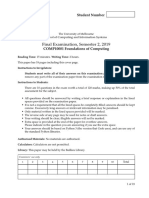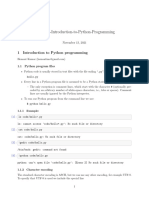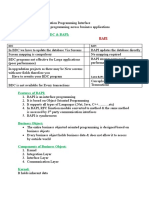Python Training: A Basic Overview
Uploaded by
AKSHAY WADITKEPython Training: A Basic Overview
Uploaded by
AKSHAY WADITKEPython Training
A basic overview
March 17, 2017 -1-
Functions, Modules & Packages
Functions
• Built-in functions
• Lambda functions
Modules
• What are modules?
• Import statements
Packages
March 17, 2017 -2-
Functions…cont.
Call by value for primitive data types
Call by reference for derived data types
– Q: Why?
– A: Reference Semantics
March 17, 2017 -3-
Functions: Parameter passing
def hello(greeting='Hello', name='world'): Adding default values to parameters
print ('%s, %s!' % (greeting, name))
hello('Greetings')
def hello_1(greeting, name): Using named parameters. In this case
print ('%s, %s!' % (greeting, name)) the order of the arguments does not
# The order here doesn't matter at all: matter.
hello_1(name='world', greeting='Hello')
def print_params(*params): The variable length function
print (params) parameters allow us to create a
function which can accept any number
print_params('Testing')
print_params(1, 2, 3)
of parameters. *params is treated as
tuple
def print_params_3(**params): Variable named parameters
print (params)
print_params_3(x=1, y=2, z=3)
def print_params_4(x, y, z=3, *pospar, **keypar): A combination of all of above cases
print (x, y, z)
print (pospar)
print (keypar)
print_params_4(1, 2, 3, 5, 6, 7, foo=1, bar=2)
print_params_4(1, 2)
March 17, 2017 -4-
Built-in functions
abs() divmod() input() open() staticmethod()
all() enumerate() int() ord() str()
any() eval() isinstance() pow() sum()
basestring() execfile() issubclass() print() super()
bin() file() iter() property() tuple()
bool() filter() len() range() type()
bytearray() float() list() raw_input() unichr()
callable() format() locals() reduce() unicode()
chr() frozenset() long() reload() vars()
classmethod() getattr() map() repr() xrange()
cmp() globals() max() reversed() zip()
compile() hasattr() memoryview() round() __import__()
complex() hash() min() set() apply()
delattr() help() next() setattr() buffer()
dict() hex() object() slice() coerce()
dir() id() oct() sorted() intern()
March 17, 2017 -5-
Lambda functions
Unnamed functions
Mechanism to handle function objects
To write inline simple functions
Generally used along with maps, filters on lists, sets etc.
Not as powerful as in C++11, Haskell etc. e.g. no looping etc.
Example: lambda x,y : x+y to add two values
March 17, 2017 -6-
Example – Lambda functions
>>> def make_incrementor(n):
... return lambda x: x + n
... >>> f = make_incrementor(42)
>>> f(0)(42) >>> f(1)(43)
The above example uses a lambda expression to return a function.
Another use is to pass a small function as an argument:
>>> pairs.sort(key=lambda pair: pair[1])
>>> pairs [(4, 'four'), (1, 'one'), (3, 'three'), (2, 'two')]
March 17, 2017 -7-
Modules
A module is a file containing Python definitions and statements intended for
use in other Python programs.
It is just like any other python program file with extension .py
Use the “import <module>” statement to make the definitions in <module>
available for use in current program.
A new file appears in this case \path\<module>.pyc. The file with the .pyc
extension is a compiled Python file for fast loading.
Python will look for modules in its system path. So either put the modules in
the right place or tell python where to look!
import sys
sys.path.append('c:/python')
March 17, 2017 -8-
Modules
Three import statement variants
import math Here just the single identifier math is added to
x = math.sqrt(10) the current namespace. If you want to access
one of the functions in the module, you need
import math as m to use the dot notation to get to it.
print m.pi
from math import cos, sin, The names are added directly to the current
sqrt namespace, and can be used without
x = sqrt(10) qualification.
from math import * This will import currentall the identifiers from
x = sqrt(10) module into the namespace, and can be used
without qualification.
March 17, 2017 -9-
Packages
Packages are used to organize modules. While a module is stored in a file with
the file name extension .py, a package is a directory.
To make Python treat it as a package, the folder must contain a file (module)
named __init__.py
File/Directory Description
~/python/ Directory in PYTHONPATH
~/python/drawing/ Package directory (drawing package)
~/python/drawing/__init__.py Package code ("drawing module")
~/python/drawing/colors.py colors module
~/python/drawing/shapes.py shapes module
~/python/drawing/gradient.py gradient module
~/python/drawing/text.py text module
~/python/drawing/image.py image module
March 17, 2017 - 10 -
Scope of variable
Although scopes are determined statically, they are used
dynamically. At any time during execution, there are at
least three nested scopes whose namespaces are directly
accessible:
– the innermost scope, which is searched first, contains
the local names
– the scopes of any enclosing functions, which are
searched starting with the nearest enclosing scope,
contains non-local, but also non-global names
– the next-to-last scope contains the current module’s
global names
– the outermost scope (searched last) is the namespace
containing built-in names
March 17, 2017 - 11 -
Scope of variable
If a name is declared global, then all references and
assignments go directly to the middle scope containing
the module’s global names. To rebind variables found
outside of the innermost scope, the nonlocal statement
can be used; if not declared nonlocal, those variables are
read-only (an attempt to write to such a variable will
simply create a new local variable in the innermost scope,
leaving the identically named outer variable unchanged).
March 17, 2017 - 12 -
Working with Files
Python supports both free form and fixed form files – text and binary
open() returns a file object, and is most commonly used with two arguments:
open(filename, mode)
Value Description
Modes: 'r' Read mode
'w' Write mode
'a' Append mode
'b' Binary mode (added to other mode)
'+' Read/write mode (added to other mode)
f = open(r'C:\text\somefile.txt')
For Input/Output: read(), readline(), write() and writeline()
March 17, 2017 - 13 -
Working with Files
Attribute Description
File Object attributes
file.closed Returns true if file is closed, false otherwise.
file.mode Returns access mode with which file was opened.
file.name Returns name of the file.
March 17, 2017 - 14 -
File handling in Python
With statement
– The advantage is that the file will be automatically closed after the indented
block after the with has finished execution
with statement for reading and writing files.
with open("example.txt", "w") as fh:
fh.write("To write or not to write\nthat is the question!\n")
with open("ad_lesbiam.txt") as fobj:
for line in fobj:
print(line.rstrip())
March 17, 2017 - 15 -
File handling
Copy a file
fobj_in = open("example.txt")
fobj_out = open("excopy.txt","w")
i=1
for line in fobj_in:
print(line.rstrip())
fobj_out.write(str(i) + ": " + line)
i=i+1
fobj_in.close()
fobj_out.close()
March 17, 2017 - 16 -
File Handling
Read entire file at one go using readlines
– The complete file is read into the list flist.
– We can acces e.g. the 3rd line with flist[2].
flist = open(“example.txt").readlines()
print(flist)
Another way to read in a - using read().
– With this method we can read the complete file into a string
fstr = open(“example.txt").read()
To display characters from 10 to 20
print(fstr[10:20])
March 17, 2017 - 17 -
File Handling
To set - or reset - a file's position to a certain position
>>> fh = open(“myfile.txt")
>>> fh.tell()
0
>>> fh.read(7)
>>> fh.tell()
7
fh.read()
', abcde fghjklmn
>>> fh.tell()
22
>>> fh.seek(9)
9
>>> fh.read(5)
abcde
March 17, 2017 - 18 -
File Handling
To set the current position 6 characters to the left:
>>> fh.seek(fh.tell() -6)
To set 4 characters to right
>>> fh.seek(fh.tell() + 4)
March 17, 2017 - 19 -
Classes & Objects
Python is an object-oriented programming language, which means that it
provides features that support object-oriented programming (OOP).
Sample class definition
class Point:
""" Point class represents and manipulates x,y coords. """
def __init__(self):
""" Create a new point at the origin """
self.x = 0
self.y = 0
p = Point()
print p.x, p.y
Constructor: In Python we use __init__ as the constructor name
def __init__(self): # a = Point()
def __init__(self, x=0, y=0): # a = Point(5, 6)
March 17, 2017 - 20 -
Classes & Objects
Methods
class Point:
""" Point class represents and manipulates x,y coords. """
def __init__(self, x=0): self.x = x
def x_square(self): return self.x ** 2
p = Point(2)
print p.x_square()
Objects are mutable.
March 17, 2017 - 21 -
Classes & Objects
Operator Overloading
class Point:
def __init__(self, x=0, y=0):
self.x = x
self.y = y
def __add__(self, other):
return Point(self.x + other.x, self.y + other.y)
def __mul__(self, other):
if isinstance(other, Point):
return Point(self.x * other.x, self.y * other.y)
else:
return Point(self.x * other, self.y * other)
def __rmul__(self, other):
return Point(self.x * other, self.y * other)
def __repr__(self):
return "({0}, {1})".format(self.x, self.y)
p1 = Point(2,3)
p2 = Point(3,4)
print p1 + p2 #prints (5, 7)
print p1 * p2 #prints (6, 12)
print p1 * 2 #prints (4, 6)
print 2 * p2 #prints (6, 8)
March 17, 2017 - 22 -
class Dog:
kind = 'canine' # class variable shared by all instances
def __init__(self, name):
self.name = name # instance variable unique to each instance
>>> d = Dog('Fido')
>>> e = Dog('Buddy')
>>> d.kind # shared by all dogs
'canine'
>>> e.kind # shared by all dogs
'canine'
>>> d.name # unique to d
'Fido'
>>> e.name # unique to e
'Buddy'
March 17, 2017 - 23 -
class Dog:
tricks = [] # mistaken use of a class variable
def __init__(self, name):
self.name = name
def add_trick(self, trick):
self.tricks.append(trick)
>>> d = Dog('Fido')
>>> e = Dog('Buddy')
>>> d.add_trick('roll over')
>>> e.add_trick('play dead')
>>> d.tricks # unexpectedly shared by all dogs
['roll over', 'play dead']
March 17, 2017 - 24 -
class Dog:
def __init__(self, name):
self.name = name
self.tricks = [] # creates a new empty list for each dog
def add_trick(self, trick):
self.tricks.append(trick)
>>> d = Dog('Fido')
>>> e = Dog('Buddy')
>>> d.add_trick('roll over')
>>> e.add_trick('play dead')
>>> d.tricks
['roll over']
>>> e.tricks
['play dead‘]
March 17, 2017 - 25 -
Classes & Objects: Operator Overloading
Operator Special method Operator Special method
self + other __add__(self, other) +self __pos__(self)
self - other __sub__(self, other) abs(self) __abs__(self)
self * other __mul__(self, other) ~self __invert__(self) (bitwise)
self / other __div__(self, other) or __truediv__(self,other self += other __iadd__(self, other)
) if __future__.division is active.
self // other __floordiv__(self, other) self -= other __isub__(self, other)
self % other __mod__(self, other) self *= other __imul__(self, other)
divmod(self,other __divmod__(self, other) self /= other __idiv__(self, other) or __itruediv__(self
) ,other) if __future__.division is in effect.
self ** other __pow__(self, other) self //= other __ifloordiv__(self, other)
self & other __and__(self, other) self %= other __imod__(self, other)
self ^ other __xor__(self, other) self **= other __ipow__(self, other)
self | other __or__(self, other) self &= other __iand__(self, other)
self << other __lshift__(self, other) self ^= other __ixor__(self, other)
self >> other __rshift__(self, other) self |= other __ior__(self, other)
bool(self) __nonzero__(self) (used in boolean testing) self <<= other __ilshift__(self, other)
-self __neg__(self) self >>= other __irshift__(self, other)
Right-hand-side equivalents for all binary operators exist (__radd__, __rsub__, __rmul__, __rdiv__, ...).
They are called when class instance is on r-h-s of operator:
-- a + 3 calls __add__(a, 3) -- 3 + a calls __radd__(a, 3)
March 17, 2017 - 26 -
Classes & Objects: Special methods for any class
Method Description
__init__(self, args) Instance initialization (on construction)
__del__(self) Called on object demise (refcount becomes 0)
__repr__(self) repr() and `...` conversions
__str__(self) str() and print statement
__sizeof__(self) Returns amount of memory used by object, in bytes (called by sys.getsizeof()).
__format__(self, format_spec) format() and str.format() conversions
__cmp__(self,other) Compares self to other and returns <0, 0, or >0. Implements >, <, == etc...
__index__(self) Allows using any object as integer index (e.g. for slicing). Must return a single integer or
long integer value.
__lt__(self, other) Called for self < other comparisons. Can return anything, or can raise an exception.
__le__(self, other) Called for self <= other comparisons. Can return anything, or can raise an exception.
__gt__(self, other) Called for self > other comparisons. Can return anything, or can raise an exception.
__ge__(self, other) Called for self >= other comparisons. Can return anything, or can raise an exception.
__eq__(self, other) Called for self == other comparisons. Can return anything, or can raise an exception.
__ne__(self, other) Called for self != other (and self <> other) comparisons. Can return anything, or can raise
an exception.
March 17, 2017 - 27 -
Classes & Objects: Special methods for any class (contd…)
Method Description
__hash__(self) Compute a 32 bit hash code; hash() and dictionary ops. Since 2.5 can also return a long integer, in
which case the hash of that value will be taken.Since 2.6 can set __hash__ = None to void class
inherited hashability.
__nonzero__(self) Returns 0 or 1 for truth value testing. when this method is not defined, __len__() is called if
defined; otherwise all class instances are considered "true".
__getattr__(self,name) Called when attribute lookup doesn't find name. See also __getattribute__.
__getattribute__( self, name) Same as __getattr__ but always called whenever the attribute name is accessed.
__dir__( self) Returns the list of names of valid attributes for the object. Called by builtin function dir(), but
ignored unless __getattr__or __getattribute__ is defined.
__setattr__(self, name, value) Called when setting an attribute (inside, don't use "self.name = value", use instead
"self.__dict__[name] = value")
__delattr__(self, name) Called to delete attribute <name>.
__call__(self, *args, Called when an instance is called as function: obj(arg1, arg2, ...) is a shorthand
**kwargs) for obj.__call__(arg1, arg2, ...).
__enter__(self) For use with context managers, i.e. when entering the block in a with-statement.
The with statement binds this method's return value to the as object.
__exit__(self, type, value, tra When exiting the block of a with-statement. If no errors occured, type, value, traceback are None.
ceback) If an error occured, they will contain information about the class of the exception, the exception
object and a traceback object, respectively. If the exception is handled properly, return True. If it
returns False, the with-block re-raises the exception.
March 17, 2017 - 28 -
Classes & Objects
Inheritance / Sub-classing
– We can create a class by inheriting all features from another class.
The “hello” method defined class A:
in class A will be inherited by def hello(self):
class B. print "Hello, I'm A."
class B(A):
The output will be: pass
Hello, I’m A. a = A()
Hello, I’m A. b = B()
a.hello()
b.hello()
– Python supports a limited form of multiple inheritance as well.
• class DerivedClassName(Base1, Base2, Base3):
– Derived classes may override methods of their base classes.
March 17, 2017 - 29 -
Exception Handling
Whenever a runtime error occurs, it creates an exception object. For
example:
>>> print(55/0)
Traceback (most recent call last):
File "<interactive input>", line 1, in <module>
ZeroDivisionError: integer division or modulo by zero
In python, the basic syntax of exception handling is
try:
some code to raise exception
except ExceptionClassName:
exception handler statements
Example
try:
1/0
except ZeroDivisionError:
print "Can't divide anything by zero."
March 17, 2017 - 30 -
Exception Handling
Below is a list of some of the built-in exceptions
Class Name Description
Exception The root class for all exceptions
AttributeError Raised when attribute reference or assignment fails
IOError Raised when trying to open a nonexistent file (among other things)
IndexError Raised when using a nonexistent index on a sequence
KeyError Raised when using a nonexistent key on a mapping
NameError Raised when a name (variable) is not found
SyntaxError Raised when the code is ill-formed
TypeError Raised when a built-in operation or function is applied to an object of
the wrong type
ValueError Raised when a built-in operation or function is applied to an object
with correct type, but with an inappropriate value
ZeroDivisionError Raised when the second argument of a division or modulo operation is
zero
March 17, 2017 - 31 -
Exception Handling
Catch more than one exception
– except (ExceptionType1, ExceptionType2, ExceptionType3):
Handle multiple exceptions one-by-one
– except ExceptionType1: <code>
– except ExceptionType2: <code>
Catch all exceptions
– except:
Capture the exception object
– except ExceptionType as e:
Use the raise statement to throw an exception
raise ValueError(“You’ve entered an incorrect value”)
The finally clause of try is used to perform cleanup activities
March 17, 2017 - 32 -
You might also like
- Red: What You'd Actually Put in Python File: Common Differences Between Python and MATLAB, Ways To Approach PythonNo ratings yetRed: What You'd Actually Put in Python File: Common Differences Between Python and MATLAB, Ways To Approach Python19 pages
- Daniela Andrea Fuentes Carillo - Cheat SheetNo ratings yetDaniela Andrea Fuentes Carillo - Cheat Sheet16 pages
- Unit V Files, Modules, Packages: File Operation and File FunctionsNo ratings yetUnit V Files, Modules, Packages: File Operation and File Functions9 pages
- Python Notes/Cheat Sheet: Operator FunctionalityNo ratings yetPython Notes/Cheat Sheet: Operator Functionality7 pages
- Lecture 1 Introduction To Python ProgrammingNo ratings yetLecture 1 Introduction To Python Programming32 pages
- Https%2Fdoc 14 2g Prod 00 Apps Viewer.googleusercontent.com%2Fviewer2%2Fprod 00No ratings yetHttps%2Fdoc 14 2g Prod 00 Apps Viewer.googleusercontent.com%2Fviewer2%2Fprod 0017 pages
- CSC148 Ramp-Up Winter 2017: Julianna PaprakisNo ratings yetCSC148 Ramp-Up Winter 2017: Julianna Paprakis78 pages
- An Introduction To Python: Phil SpectorNo ratings yetAn Introduction To Python: Phil Spector26 pages
- 4. Python Functions, Modules and PackagesNo ratings yet4. Python Functions, Modules and Packages23 pages
- Lesson 10 Working with External Data TypesNo ratings yetLesson 10 Working with External Data Types72 pages
- 44 Python Learning Questions and AnswersNo ratings yet44 Python Learning Questions and Answers12 pages
- Python: Advanced Guide to Programming Code with Python: Python Computer Programming, #4From EverandPython: Advanced Guide to Programming Code with Python: Python Computer Programming, #4No ratings yet
- Mastering Go A Practical Guide to Developers: A Practical Guide to DevelopersFrom EverandMastering Go A Practical Guide to Developers: A Practical Guide to DevelopersMiguel Miranda de MattosNo ratings yet
- How To Activate Windows 7 For Free (100% Working 2020) Product KeyNo ratings yetHow To Activate Windows 7 For Free (100% Working 2020) Product Key10 pages
- Troubleshooting and Debugging TechniquesNo ratings yetTroubleshooting and Debugging Techniques15 pages
- Web Services Guide: Public SAP Cloud Integration For Data Services 1.0.11 2021-04-12No ratings yetWeb Services Guide: Public SAP Cloud Integration For Data Services 1.0.11 2021-04-1238 pages
- Custom Action Link in Workflow E-Mail NotificationNo ratings yetCustom Action Link in Workflow E-Mail Notification10 pages
- Orca Share Media1667144269752 6992509879199379878No ratings yetOrca Share Media1667144269752 69925098791993798783 pages
- S10 GSRD - User Manual: Home Documentation Community Projects Boards NewsNo ratings yetS10 GSRD - User Manual: Home Documentation Community Projects Boards News1 page
- Design and Implementation of Relational DBMSNo ratings yetDesign and Implementation of Relational DBMS19 pages
- Donut Smile For G8F & GF8.1: Mini-TutorialNo ratings yetDonut Smile For G8F & GF8.1: Mini-Tutorial3 pages
- Spring Framework Reference Documentation PDFNo ratings yetSpring Framework Reference Documentation PDF685 pages

























































































